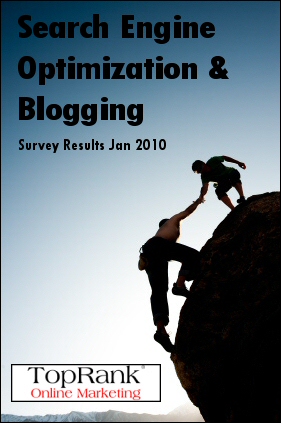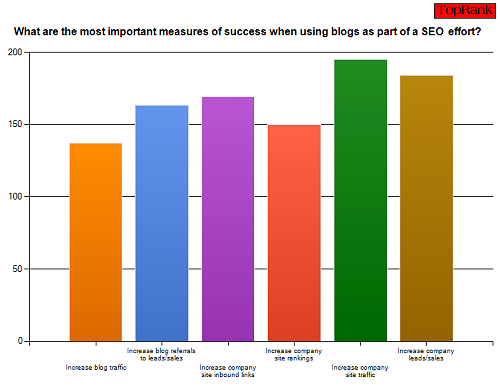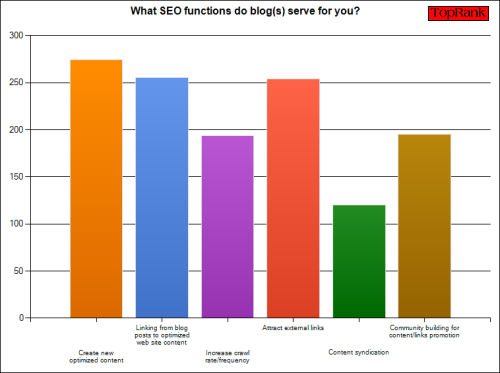 Recently I posted a series of informal poll questions about blog SEO on Twitter to gain insights and feedback which were leveraged to construct a more in-depth survey. I used the longer survey to collect information on how companies are using blogs for search engine optimization purposes and what kind of impact those efforts have. Essentially, I wanted to get opinions on and answers to: “Are blogs still important for SEO and why?”.
Recently I posted a series of informal poll questions about blog SEO on Twitter to gain insights and feedback which were leveraged to construct a more in-depth survey. I used the longer survey to collect information on how companies are using blogs for search engine optimization purposes and what kind of impact those efforts have. Essentially, I wanted to get opinions on and answers to: “Are blogs still important for SEO and why?”.
The topic of business blogging and search engine optimization as distinct and synergistic tactics have been explored here many times. A large number of companies are familiar with the process of starting a blog, but few have experienced the challenges of maintaining and growing a blog for more than a year.
Understanding long term benefits is key to sustainable business blogging.
Part of the goal was to tap into a variety of experience levels with this survey and capture insight into the SEO impact blogging.
Participants were solicited here, on social networks and vial email that blog. Here’s a simple breakdown of the 326 survey respondents:
- 28% Internal Corporate: Advertising, Marketing or PR
- 42% Agency: Advertising, PR, Search Marketing, Social Media, Marketing
- 30% Independent Consultant or Small Biz CEO
One of the biggest questions we were looking to get insight on was the degree to which marketers are using blogs as a SEO asset.
95% of survey respondents indicated that they do incorporate blogs as part of their search engine optimization efforts
While the majority of respondents indicated SEO as a benefit to blogging, several comments indicated that there are resource issues: “We did but resources became an issue. Will be bringing it back in 2010.” And that the applicable use of blogging for SEO outcomes depends on the market: “Sometimes… depends on client and market and product/service”.
Blogs at the most basic level are straightforward or “easy” to start. But the real question is whether they deliver on the SEO promise so many blog marketers make. Our survey results show that 87.4% of respondents “successfully increased measurable SEO objectives as a direct result of blogging“. Savvy SEO practioners made comments like, “Absolutely. In fact, we make sure to create a small, quality cluster of blogs on different platforms and Class C IP’s to support their communications initiatives.”
Of the 12.6% that didn’t find measurable SEO results from blogging, comments like “starting to but since we don’t post comments from readers on our blog I think we stall any momentum that we are generating from our posts” and “Site owners are not able to follow through on keeping up with their blog.” provided insight as to possible reasons why.
How important are blogs as part of a SEO strategy? The majority of respondents (90%) cited blogging as important, significantly important or a primary SEO tactic. The remaining 10% rated blogs as somewhat important or irrelevant.

Many company marketers, public relations and communications professionals are not aware of what the SEO benefits of blogging are. We asked, “What SEO functions do blog(s) serve for you?”. While the responses were fairly evenly distributed, the most popular SEO benefit was that blogs provide an easy way to create new, optimized content. Content is the cornerstone for any search engine optimization or social media marketing effort, so it makes sense that content creation was so popular.
Overall, links were the most often cited SEO benefit from blogging: Attracting inbound links from other web sites or cross-linking from blog posts to corporate site content. Community building for content/links promotion and Increase crawl rate/frequency were also indicated as important SEO benefits from blogging. Additional social and SEO benefits from blogging mentioned include:
- Social Media word of mouth
- Show a human side to a business and another side to the more “static” web site
- Communicate back with customers
- Can surprisingly create evergreen #1 search rankings for odd phrases we might not have necessarily thought about in planning.
- We’ll serve ads through a network that allows blogs to publish our ads
- Traffic from twitter and the increased exposure that goes with that
- Establish authority in the marketplace
- Promoting products, services, sales, expertise … I come at it from the UX side – credibility, authenticity
- Blog is ideal for long tail search terms
- More long tail ranking
- Blogs dovetail well with social media efforts like twitter
- Focused silos around specific markets and functions key to the client.
With any new marketing effort, setting expectations for time to see results is crucial for allocating resources and budgeting. We asked, “In what time frame do you typically start to see an increase in measurable SEO performance indicators (links, ranking, traffic) as a result of blogging?” The most common answer was somewhat shorter than expected, 0-3 months. 54% of respondents start to see SEO benefits from blogging very quickly. This short time frame should be very encouraging to those hoping to use blog published content to gain better search engine visibility.

Since many of our respondents were professional search marketers with the ability to properly optimize a blog and promote content to attract links, time frames for results would be very different than someone who does not know how to implement blog SEO tactics.
94% of bloggers reported seeing measurable SEO benefits from blogging within 12 months
Measuring impact is important and certainly, the definitions of success from blogging will vary according to the purpose of the blog. We asked, “What are the most important measures of success when using blogs as part of a SEO effort?”. The responses to this question were fairly evenly divided with increasing company site traffic at the top closely followed by a desire to increase company leads/sales. Other important metrics included inbound links, referrals or leads directly from the blog, web site rankings and blog traffic.

Additional success measures from blogging included many benefits besides search engine optimization, which is very important in our opinion. Starting a blog purely for SEO reasons will make content sustainability difficult in the long run. A blogging strategy must meet meet other goals as well, especially those that involve engaging customers or interactions with readers. Other success measures from blogging include:
- Increase overall online exposure. They won’t know about you if you don’t say anything, participate
- Contribute to company’s bottom line goals in at least a semi-direct way
- Branding and owning SERPS
- Increase quality of site traffic
- Improve visibility and prominence in search engine results is by far the most important, it’s all about search
- Branding
- Incease visibility and demonstrate the company is “up to date”
- Increase of Peoples (incl. existing customers) awareness of things and what you (the business) does and can do for them. It is not really quantifyable, but noticable and very important. It impacts all other figures mentioned, but indirectly.
- Increase positive blog mentions
- Increase Transparency which in turn builds loyalty.
- Puts a face on company; great customer service signal; illustrates USP over competitors
- Depends totally on strategic objectives – for some it’s leads/sales, for others it’s thought leadership
- Increase overall community interaction
- All – It depends on the objectives of the campaigns – be it traffic, sales, awareness, etc.
- The only real measure of success is conversions linked to organization goals (sales or whatever)
- Increased engagement on the blog or elsewhere
- All of these are important measures, but sales has to be number one.
- I don’t believe that blogs take the place of traditional marketing/sales tactics… they just make them easier and more credible
- Increase colloquial “voice” of the CEO/CMO/CTO/Social Marketing specialist. Finding and amplifying the voice of the company/founder/visionary.
Getting a blog implemented in a company is not always an easy task. Resources can be slim as well as expertise and confidence in the ability to achieve a return on effort within a given period of time. We asked, “What have been the most common objections from internal or external clients to implement blogs (with or without SEO benefit)?” This question received the most comments of all in the survey.
67.2% cited resource issues as the most common objection to implementing a blog
Other reasons cited included issues with content sourcing (42%) or simply not seeing the benefit (35%). Regulated industry or legal issues got in the way for 19.3% and lack of measurement round up the answers with 12.9%. Many of the comments about obstacles to blogging centered around time, resources, measurement and a lack of awareness.

On the surface, implementing a blog is straightforward, once you gain approval. The trick is sustainability and reaching measurable goals. Staying on top of what strategies and tactics are successful blogging also takes time and therefore it’s important what resources marketers depend on. We asked, “How do you stay current with blog SEO best practices?”. The overwhelming most popular answer was Other SEO blogs. The good news about that answer is that we publish a list of over 500 SEO and Internet Marketing related blogs on the TopRank BIGLIST.
Other popular resources for staying current with blogging and SEO include: Social Networks & Groups, Conferences, Observations from Testing, Newsletters, Forums and books. Interestingly, Paid Subscription Communities ranked lowest which is a niche community.
92% of respondents feel blogging will continue to be an important content optimization and marketing tactic for the next 3+ years
Interestingly, 8.3% feel blogging will only be important for the rest of 2010.
What is your opinion on the longevity of blogging as an online communications and marketing tool? Do you think the death of blogs is imminent in 2010? What blogging benefits have you experienced and how have you overcome objections to implementing a blog in your company?
We hope this survey and results have been helpful to you and plan on conducting many other surveys in 2010 to provide additional insights into digital marketing and PR topics. Clearly, there is interest and a need for companies to better understand the strategic and practical applications of business blogging. Specifically, there is benefit in understanding how search and social channels can be combined with core blog content publishing to reach business goals. We hope to continue providing such insight here at Online Marketing Blog as well as the conferences and corporate training events we’re engaged to speak at.



